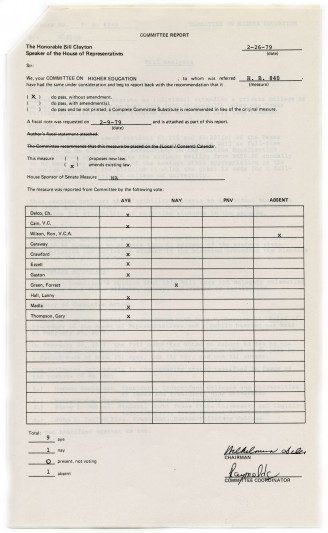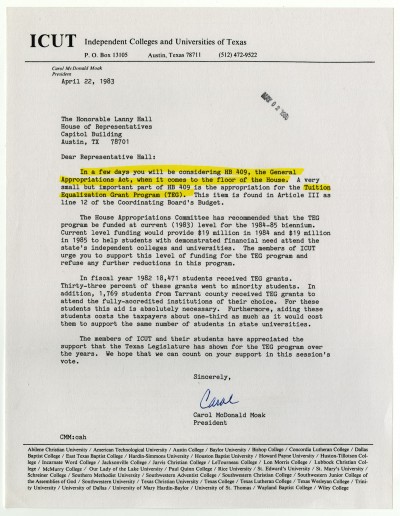
House Committee Report for H. B. 840, 26 February 1979. Taken from the Lanny Hall Collection. UNTA_AR0177-008-003.
1971 saw the creation of the Texas Equalization Grant (TEG) Program, a federal aid program for students attending independent colleges in Texas. The grant helped students attend independent universities, which received less financial aid than state-supported colleges. The original eligibility requirements were fairly simple, though they have become more restrictive over the years.
- The student must be a qualified Texas resident
- The student must be enrolled at least half-time as a student in an approved independent college or university in the state of Texas
- The student must establish financial need as defined by the Coordinating Board and the Texas College and University System
- The student must not be the recipient of any form of athletic scholarship
- The student must not be enrolled in a theological or religious degree program
In 1979, Lanny Hall, as part of the Committee on Higher Education, voted to pass House Bill 840, which outlined new eligibility requirements for the grant, as well as funding for the program. A Fiscal Note from the Legislative Budget Board states an expected annual increase of 16% in the maximum grant gifted to a student, and an annual increase of 2% in the number of grants provided.

A letter to Representative Lanny Hall from the Independent Colleges and Universities of Texas, 22 April 1983. Taken from the Lanny Hall Collection. UNTA_AR0177-008-002.
North Texas has more independent universities than any other region in the state, giving local students plenty of choices and incentive to continue their education. This letter to Representative Hall from the Independent Colleges and Universities of Texas claims that 1,769 of the 18,471 grants given out in 1982 went to Tarrant County students. That’s 9.5%, which says quite a bit considering there are 253 other counties in the state. Schools these students attended included Texas Christian University, Texas Wesleyan University, Southern Methodist University, and the University of Dallas.
Edwin “Lanny” Hall served Tarrant County as a Representative in the Texas House during the sixty-sixth, sixty-seventh, and sixty-eighth legislatures (1979-1984). The Lanny Hall Collection contains records from his time in the Texas House of Representatives, pertaining to subjects such as public education, tuition rates and funding for colleges and universities, equal rights and LGBT issues, transportation, health topics, and many more.



Leave a Reply